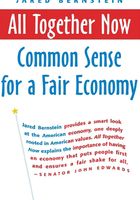
AFTER THE STORM:
A POTENTIALLY TRANSFORMATIVE MOMENT
Eventually stories of the flood receded from the front page, but the sentiments remained. As I mentioned, part of my job is to debate national economic policy, and I’m well aware that two economists hammering it out on CNBC as to whether the Bush tax cuts really created jobs, or whether the Federal Reserve should raise interest rates, seems more like weird entertainment than something that might yield useful insights. Yet, in the post-Katrina world, the discussion felt a lot more urgent. Suddenly, something important seemed to be riding on whether we could blithely add more than $100 billion to the deficit for rebuilding hurricane-damaged areas while engaging in further tax cuts for the wealthy. All of a sudden, we stumbled upon a potentially transformative moment in history and politics.
After the storm, at least for a while, there was a sense that it matters how we as a nation handle the responsibility of economic policy (and by we I mean the electorate, a bunch of people who collectively decide whom we appoint to set the nation’s agenda). It matters how we approach the big problems of the day: globalization, national health care, taxes, our stagnating and ever more unequal incomes. But it also matters how we approach the problems in our everyday lives.17
The incredibly uneven quality of our public schools, the eroding quality and cost shifting of employer-provided health care and pensions, the increasing insecurity of all jobs, not just those in manufacturing—all these problems link back to an ongoing shift in the way we view the role of government in our lives. That view has evolved from a mind-set that dates back to the Depression. Under that mind-set, which persisted until about a generation ago, more of us had a greater sense that we’re all in this together and that it is our right and our privilege as a society to take the needed steps to ensure our economic security.
We’ve lost that sense. With the ascendancy of YOYO philosophy, we’ve lost the ability to come together and create the government we need to meet the economic and social challenges we face at every level. Under YOYO, we can neither shape the way globalization plays out in our lives, nor invest in quality education in our neighborhoods.
It is of course not the only important shift that’s occurred. Obviously, our electorate is closely divided along various lines, and I discuss this aspect of the problem in chapter 4 (how can we come together when our views and values seem so different?). But tragedy has a way of pushing our differences into the background. Red stater or blue stater, any one of us could have been caught in that storm, just as any of us could be caught in the sights of terrorists. In Katrina’s aftermath, there existed, at least for a few weeks, an uneasy sense that the path down which YOYO politics has been taking us is as dangerous as it is unsustainable. And of course, many of us felt this long before the New Orleans levees gave way.18
In this regard, when he asserted that America may well be a stronger place once we recover from this devastating blow, the president may have been right. But ironically, it will be because we once again see the danger in the type of government that his administration, with the help of the Congress, has so aggressively been pursuing. The Katrina debacle was a terrible wake-up call, reminding us of the costs of losing sight of our connections to each other.